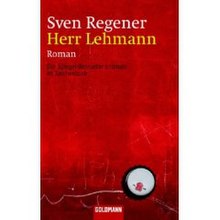
The Trial is a novel written by Franz Kafka in 1914 and 1915 and published posthumously on 26 April 1925. One of his best-known works, it tells the story of Josef K., a man arrested and prosecuted by a remote, inaccessible authority, with the nature of his crime revealed neither to him nor to the reader. Heavily influenced by Dostoevsky's Crime and Punishment and The Brothers Karamazov, Kafka even went so far as to call Dostoevsky a blood relative. Like Kafka's two other novels, The Castle and Amerika, The Trial was never completed, although it does include a chapter which appears to bring the story to an intentionally abrupt ending.

Kreuzberg is a district of Berlin, Germany. It is part of the Friedrichshain-Kreuzberg borough located south of Mitte. During the Cold War era, it was one of the poorest areas of West Berlin, but since German reunification in 1990, it has become more gentrified and is known for its arts scene.
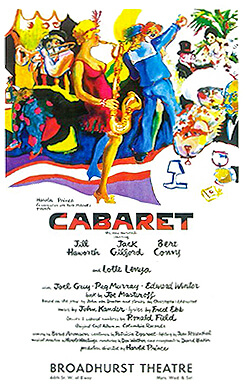
Cabaret is an American musical with music by John Kander, lyrics by Fred Ebb, and a book by Joe Masteroff. It is based on the 1951 play I Am a Camera by John Van Druten, which in turn was based on the 1939 novel Goodbye to Berlin by Christopher Isherwood.
Reinhard Lettau was a German-American writer.
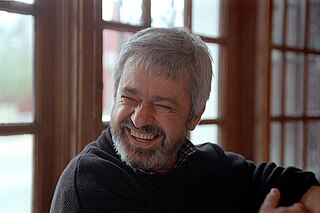
Jurek Becker was a Polish-born German writer, screenwriter and East German dissident. His most famous novel is Jacob the Liar, which has been made into two films. He lived in Łódź during World War II for about two years and survived the Holocaust.

Sven Regener is a German musician and writer living in Berlin. In 1982 he recorded his first LP with the band Zatopek and in 1984 he joined Neue Liebe. In 1985 he founded the Berlin band Element of Crime together with Jakob Friderichs. He writes almost all their lyrics as well as playing trumpet.
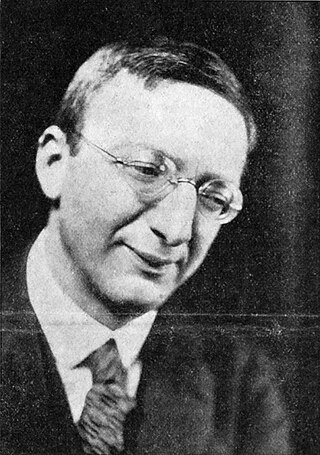
Bruno Alfred Döblin was a German novelist, essayist, and doctor, best known for his novel Berlin Alexanderplatz (1929). A prolific writer whose œuvre spans more than half a century and a wide variety of literary movements and styles, Döblin is one of the most important figures of German literary modernism. His complete works comprise over a dozen novels ranging in genre from historical novels to science fiction to novels about the modern metropolis; several dramas, radio plays, and screenplays; a true crime story; a travel account; two book-length philosophical treatises; scores of essays on politics, religion, art, and society; and numerous letters—his complete works, republished by Deutscher Taschenbuch Verlag and Fischer Verlag, span more than thirty volumes. His first published novel, Die drei Sprünge des Wang-lung, appeared in 1915 and his final novel, Hamlet oder Die lange Nacht nimmt ein Ende was published in 1956, one year before his death.

Deadeye Dick is a novel by Kurt Vonnegut originally published in 1982.
Lehmann is a German surname.

Die tote Stadt, Op. 12, is an opera in three acts by Erich Wolfgang Korngold set to a libretto by Paul Schott, a collective pseudonym for the composer and his father, Julius Korngold. It is based on the 1892 novel Bruges-la-Morte by Georges Rodenbach.

The Berlin Stories is a 1945 omnibus by Anglo-American writer Christopher Isherwood and consisting of the novels Mr Norris Changes Trains (1935) and Goodbye to Berlin (1939). The two novels are set in Jazz Age Berlin between 1930 and 1933 on the cusp of Adolf Hitler's ascent to power. Berlin is portrayed by Isherwood during this chaotic interwar period as a carnival of debauchery and despair inhabited by desperate people who are unaware of the national catastrophe that awaits them.

Breakfast in the Ruins: A Novel of Inhumanity is a 1972 novel by Michael Moorcock, which mixes historical and speculative fiction. It was first published in the United Kingdom by the New English Library. The novel centres on Karl Glogauer, who is also the protagonist of Moorcock's Nebula Award winning novella, Behold the Man, his homosexual exploits with an unnamed man from Nigeria, and his fantasies of the past and lives that he could have led.
A Woman in Berlin is a memoir by German journalist Marta Hillers, originally released anonymously in 1954. The identity of Hillers as the author was not revealed until 2003, after her death. The memoir covers the period between 20 April and 22 June 1945 in Berlin during the capture and occupation of the city by the Red Army. The work depicts the widespread rape of civilians by Soviet soldiers, including the rape of the author. It also looks at a woman's pragmatic approach to survival, which involved relying on Soviet officers for protection.
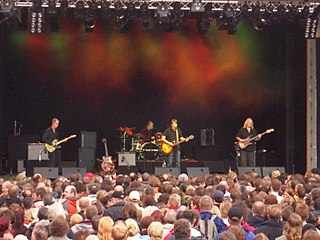
Element of Crime is a German rock band that plays melancholic chanson, pop and rock music with guitar, bass guitar, drums and voice/trumpet.
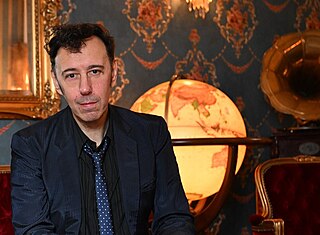
Paul Bonin is a singer and musician and a songwriter/composer. His body of published recorded work spans from 1980 to the present day.

Sally Bowles is a fictional character created by English-American novelist Christopher Isherwood and based upon 19-year-old cabaret singer Jean Ross. The character debuted in Isherwood's 1937 novella Sally Bowles published by Hogarth Press, and commentators have described the novella as "one of Isherwood's most accomplished pieces of writing." The work was republished in the 1939 novel Goodbye to Berlin and in the 1945 anthology The Berlin Stories.
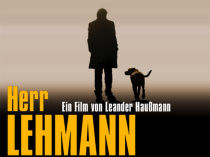
Berlin Blues is a 2003 German film by Leander Haußmann, based on the novel of the same name by Sven Regener.

Homo Sapiens Berliner Art is the first episode in a semi-autobiographic series of satirical novels by the German writer Albrecht Behmel.

Janosch Dahmen is a German physician and politician of Alliance 90/The Greens who has been serving as a member of the Bundestag since 2020, representing the Hagen – Ennepe-Ruhr-Kreis I district.
